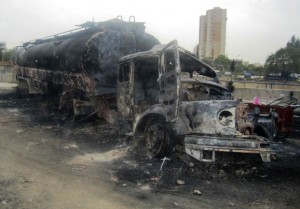 Fuel trucks headed to Syria have repeatedly come under attack in Lebanon in recent weeks, as Lebanese gunmen sympathetic to Syria’s rebels try to stanch the government’s access to imported supplies.
Fuel trucks headed to Syria have repeatedly come under attack in Lebanon in recent weeks, as Lebanese gunmen sympathetic to Syria’s rebels try to stanch the government’s access to imported supplies.
With Lebanon’s government doing nothing to stop the shipments, opponents say their attacks are necessary to halt the delivery of as much as 250,000 gallons of diesel fuel a day by private Lebanese companies, a flow they say is helping to sustain the war effort of the Syrian military in a conflict that has left more than 70,000 dead.
While Syria is a large producer of crude oil, its limited refining capacity has long left it dependent on imported gasoline and diesel, and the disruptions in supplies caused by the two-year-old civil war have made those needs more acute. Rebel forces now control the majority of Syria’s oil fields.
The attacks on the fuel trucks underscore how deeply the war in Syria has left Lebanon divided, with most Sunnis supporting the opposition while most Shiites support the government of Syrian President Bashar al-Assad.
“There is a political and military motive for these attacks,” said Hilal Khashan, a professor of political science at the American University of Beirut. “Fuel is a strategic military weapon. And private companies in Lebanon are supplying the regime with fuel, mostly to operate its military machine.”
In a February report, the U.S. Energy Information Administration said Syria’s increasing need for heating oil and diesel was prompting the country to seek deals with Russia, Venezuela, Iraq and Iran. The flow from Lebanon probably represents an additional channel, industry analysts say, with the deliveries arranged by Lebanese businessmen who buy fuel from suppliers in European countries such as Greece and France.
Any export of fuel to the Syrian government could be punishable under U.S. sanctions that were imposed to put pressure on the Assad government, U.S. officials say, and the exporter could be subject to measures that could freeze property and bank accounts.
But in Lebanon, the attacks in recent months have made clear that opponents of the Syrian regime feel capable of taking matters into their own hands.
Loay Meqdad, a spokesman for the Free Syrian Army, said opposition sympathizers have followed the trucks coming from the Lebanese side of the border that have been supplying fuel to the elite 4th division of the Syrian army.
“Any drop of fuel coming from Lebanon supports the killing of our people because they are used for military equipment and are an act of war against us,” Meqdad said. “The Free Syrian Army has the right to all actions that prevent the import of fuel.”
The most recent attack on tankers bound for Syria came earlier this week, when gunmen fired on several trucks in the northern Lebanese city of Tripoli, injuring one driver seriously, according to local media reports and a senior Lebanese security official who asked not to be identified because of the sensitivity of the issue.
The senior security official said the trucks were carrying blankets and other consumer goods, while other security officials quoted by local media said the trucks had been carrying fuel. The senior security official said that exports by Lebanese companies to Syria had peaked at more than 250,000 gallons a day, but that the volume had dropped somewhat after the recent attacks.
Rebels’ anger at Lebanon
Until the onset of the Syrian civil war in 2011, most fuel traffic moved in the opposite direction, with Lebanese companies relying on smugglers to gain access to cheap, subsidized products from Syria, industry experts say.
Because Lebanon’s government has not halted the flow into Syria, some rebel groups there have gone so far as to demand that Lebanon’s recently resigned prime minister, Najib Mikati, be arrested for providing tacit support to the Syrian regime. Mikati, who resigned over other issues, has said only that the Lebanese government is not playing a role in the importation or delivery of the fuel.
The disruption of the fuel supply from Lebanon to Syria began in mid-February, when militants blocked highways near Tripoli and other Sunni-dominated areas of north Lebanon to prevent the movement of the tanker trucks, according to local media reports.
On at least one occasion, militants fired on a fuel convoy in northern Lebanon and destroyed a truck, which was then spray-painted with the phrase “Jabhat al-Nusra,” according to the senior Lebanese security official. Jabhat al-Nusra, which is also known as the al-Nusra Front, is the Syrian rebel group blacklisted by the U.S. government because of its alleged links with al-Qaeda in Iraq.
The group has spread its influence in north Lebanon in recent months, the security official said.
Tensions increased when Sunni leaders rallied behind the cause. The firebrand Sunni cleric Ahmad Assir, who is based out of the city of Saida, south of Beirut, called on his supporters to block the movement of fuel trucks headed to Syria during a news conference in mid-February.
In mid-March, a handful of fuel tankers were torched in north Lebanon, leading several suppliers to curb their exports, industry observers say.
Those attacks inflicted enough of a cost that at least some suppliers have cut back on their deliveries into Syria, industry experts say, but the stance taken by the Lebanese government leaves a door open for the flow to resume.
“What the government needs to do to avoid further attacks in the future is to announce its policy on the supply of the regime in Syria with fuel,” said Khashan, the professor at the American University in Beirut.
Washington Post

Leave a Reply
You must be logged in to post a comment.